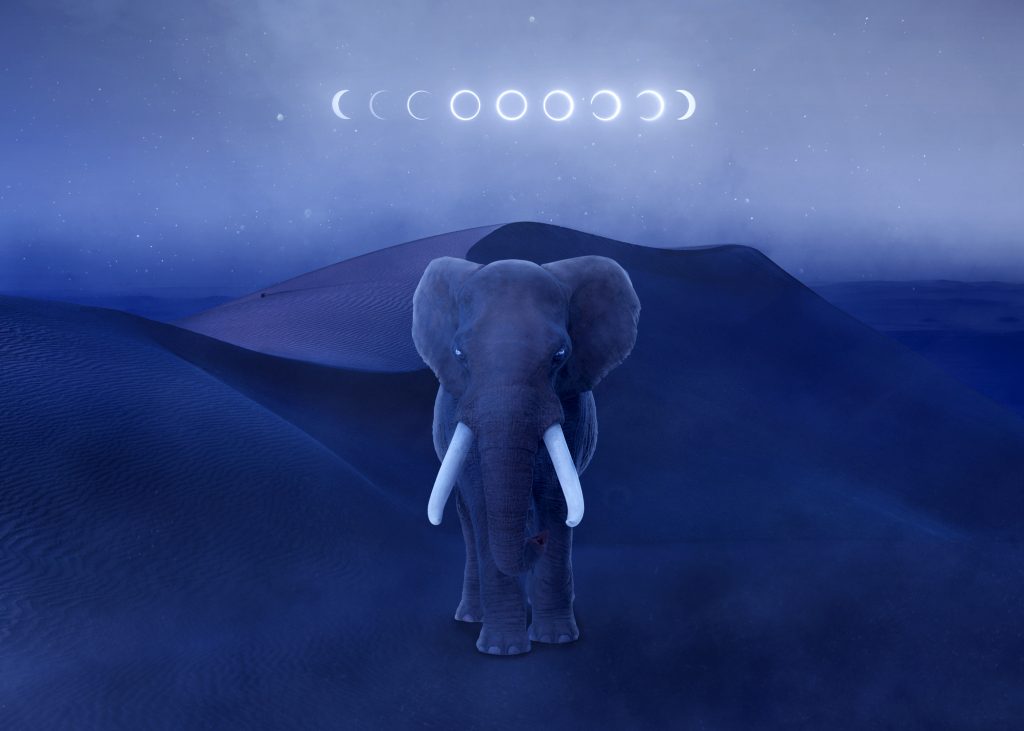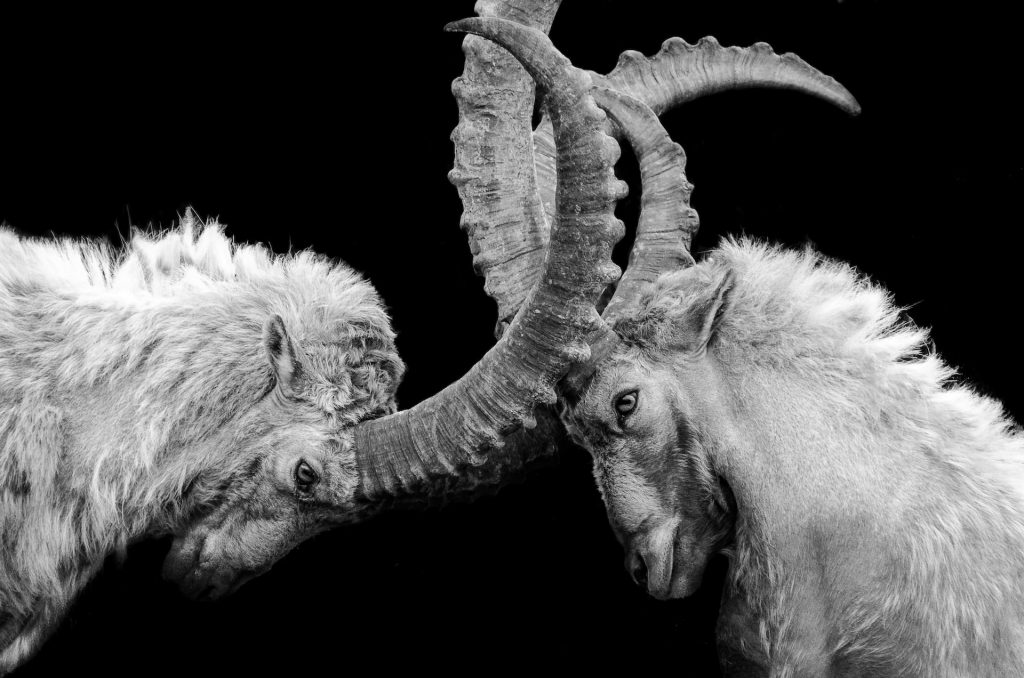A king brought his army and camped in the desert, nearby a blind community. He had a mighty elephant, which he used in attack and to increase the people’s awe.
Some from among the community run like fools to find the elephant. None has ever seen one. They gathered information by touching some parts of it.
Each thought that they knew something because they could feel a part.
When they returned to their people, gatherings formed around them. Each individual learned the truth from those who were themselves misguided.
They asked about the form and shape of the elephant. All listened to what was told.
The man whose hand had reached the ear said: “It is a large, rough thing, wide and broad, like a rug.”
And the one who felt the trunk said: “I have the real facts about it. It is like a straight and hollow part, awful and destructive.”
The one who felt its feet and legs said: “It’s mighty and firm like a pillar.”
Each one felt one part out of many. Each had perceived it wrongly.
No mind knew it all: knowledge is not the companion of the blind.
When Confidence Becomes Ignorance

Sufi teaching masters used this story for centuries.
Rumi’s teacher Hakim Sanai mentioned it. A different version can be found in Rumi’s book Mathnavi.
The common point is that we’re convinced we understand the whole by knowing a fraction of it.
I don’t know why I like this story. Maybe because the image is captivating.
Or maybe because it’s pointing at something we commonly do.
We derive certainties from our partially gained knowledge.
We argue, fight, and shut down to protect our misleading certainties.
But if those blind people came together, they could have a more accurate idea of the elephant.
Just like a puzzle, we start seeing the big picture when we combine different pieces.
When we navigate a complex world with partial knowledge, blindness is unavoidable.
But we could have a chance to see the whole by bringing our parts together.
Different People; New Opportunities

“O humanity! Indeed, We created you all from a single man and a single woman, and made you into peoples and tribes so that you may get to know one another. In God’s eyes, the most honored of you are the ones most mindful of Him: God is all knowing, all aware.” [Quran 49:13]
The English translation doesn’t reflect an essential meaning of the word “peoples”.
The Arabic root of this word—Shaab—means a crack in the wall.
Every nation is like a wall; people are the bricks that form it.
Certain qualities bind these people together.
However, no nation has been granted perfection.
By interacting with one another, people and nations can learn their weaknesses and thus, fill out the cracks.
Differences are new learning opportunities.
Clash of Worldviews

Our worldviews are made of our unique experiences and the opinions of people we trust.
As we all have different experiences and trust different people, there’s no chance of having similar worldviews.
When two different worldviews bump into each other, anomalies start rising. Some thoughts and opinions don’t fit on our map.
How an elephant can be “like a rug” and also “like a pillar”?
So we find ourselves with two options:
Either our worldview is wrong or the other worldview is wrong.
It is hard to admit our ignorance so we choose the second option.
Even if there are alternatives to this binary scenario, we fail to consider them.
We can be both wrong, both right, or both have incomplete models of the world.
The biggest obstacle to learning is assuming we already know.
From Seeking Knowledge to Acting with Wisdom

William Cowper wrote:
“Knowledge is proud that he has learned so much;
Wisdom is humble that he knows no more.”
Piling up knowledge is not the end goal.
Knowledge is merely a raw material with which wisdom is built.
Knowing a lot is not difficult.
Unlocking the benefits of knowledge is the hard part.
When you succeed in doing so, you’ll be called wise.
We Muslims have a famous dua (supplication) about knowledge.
The Messenger of Allah (pbuh) said:
“O Allah, benefit me with what you have taught me, teach me what will benefit me, and increase my knowledge.” [Sunan al-Tirmidhi]
From this hadith, we learn that the opposite scenarios are also possible.
We can learn beneficial knowledge without benefiting from it, spend time learning what has no benefit, or experience a decrease in beneficial knowledge.
So we seek refuge in Allah from these scenarios.
Final Thoughts

Initially, the story of the blinds and the elephant is about divine essence.
It highlights the impossibility of knowing it all.
The story is also great for tempering our rigidity.
Rumi said:
“Sell your cleverness and buy bewilderment.”
Bewilderment is a much-needed quality in our polarized societies.
It creates a space for uncertainty which opens the door for dialogue and learning.
Despite its obvious advantages, bewilderment is scary.
What if we change?
Our beliefs are interconnected. Changing one might impact all of them.
And what about our tribe?
Abandoning previous beliefs is a risk of losing our social ties.
So, certainties, bewilderment, or both?
I leave that to you.
Article published: August 27, 2022
Popular Articles
- 7 Lessons from Luqman that Will Make You Wise
- Are Muslims Meant to Be Sleep Deprived?
- How to Enjoy Salat and Make it Meaningful
- Mongols Invasions: Some Forgotten Lessons to Today’s Muslims
- Islamic Psychology: A Model Where Faith Has Its Place
- Muslims Judging Each Other: Why and How to Be Less Judgy
- 3 Tips to Unlock the Believer Mindset
- How to Honor the Prophet
- Healing with the Medicine of the Prophet
- How to Make People Change their Mind: Persuasion!
- The Value of Time
- Islamic Medicine from a Sufi Perspective (Part 1)
- The Certainties of Muslims in an Uncertain World
- Allah According to Allah: The Beauty Behind the Verse of Light
- 5 Powerful Duas from the Quran to Help You in Both Worlds
